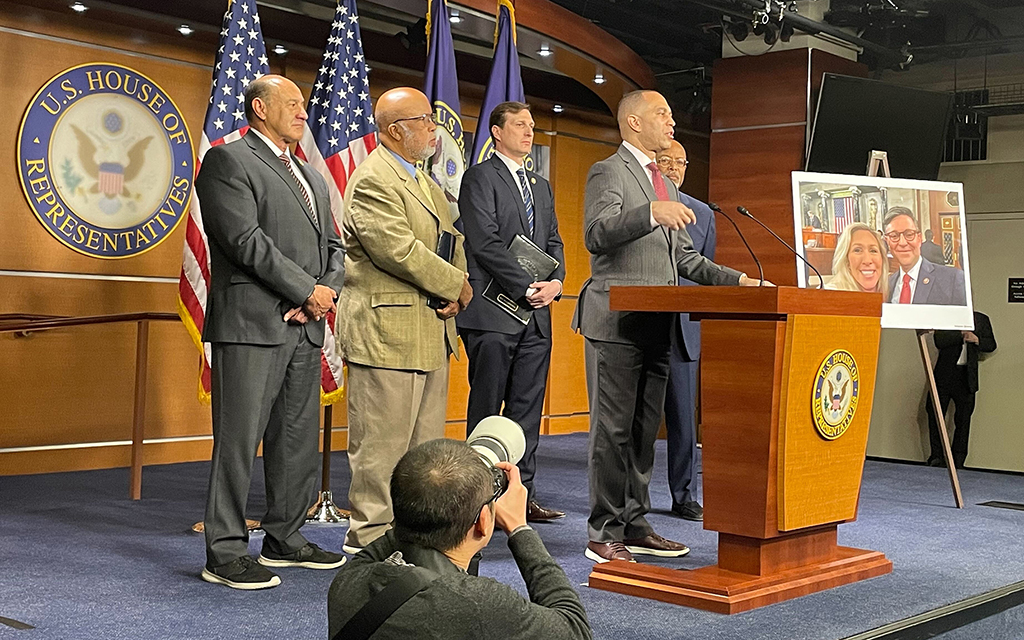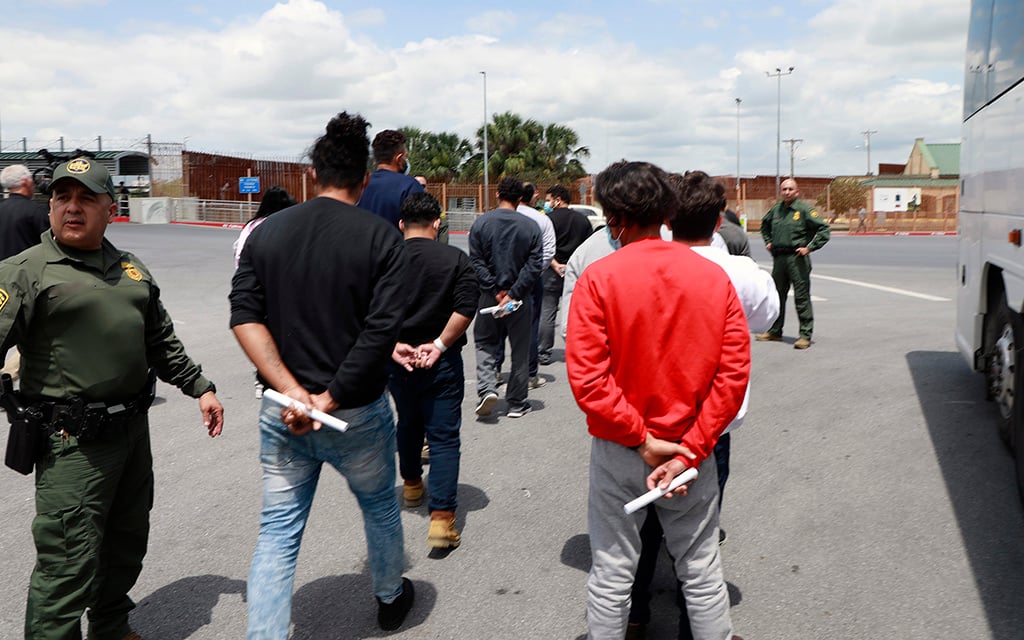WASHINGTON – Border officials said they encountered more than 300,000 migrants at the southern border in December, setting a one-month record that pushed the total for the first quarter of fiscal 2024 to 785,422.
The continuing surge in migrants comes as debate on immigration is heating up in Washington. Senators this week are expected to unveil a sweeping, bipartisan immigration reform bill that is already being called “dead on arrival” in the House, where a committee is set to start impeachment proceedings Tuesday against Homeland Security Secretary Alejandro Mayorkas.
“I wanted to provide a brief update regarding the supplemental and the border, since the Senate appears to be unable to reach any agreement,” House Speaker Mike Johnson said in a “dear colleague” letter Friday. “If rumors about the contents of the draft proposal are true, it would have been dead upon arrival in the House anyways.”
Details of the Senate plan have not been officially released. But President Joe Biden, in a plea to lawmakers Friday to pass a bill, said the Senate plan that has been negotiated with the White House would “be the toughest and fairest set of reforms to secure the border we’ve ever had in our country.”
“It would give me, as president, a new emergency authority to shut down the border when it becomes overwhelmed. And if given that authority, I would use it the day I sign the bill into law,” Biden said.
Customs and Border Protection said that preliminary numbers for January show a 50% decrease in the number of migrants encountered between ports of entry from the 302,034 encountered in December. But fiscal 2024 is still on pace to set a record for the number of migrants encountered.
December also marked the sixth straight month that the Tucson sector was the busiest border sector, with 80,185 encounters. Close to 220,000 migrants were stopped in the Tucson and Yuma sectors in the first three months of fiscal 2024, according to CBP data.
David Bier, associate director of immigration studies at Cato Institute, said encounters this fall and winter are following the same pattern as a year earlier.
“Last December we saw a huge number of people come to the border because they believed the Senate was going to end the right of asylum in the United States and force deportations of everyone who’s arriving,” Bier said Monday.
“A huge number of people who were waiting in Mexico to try and enter legally abandoned their efforts to do that because they don’t know if that option would even exist in the future and there were rumors that said it would not exist,” he said. “A lot of people said, ‘Now is the time to go.'”
Mario Russell, executive director of the Center for Migration Studies, said the Biden administration has been successful at reducing the number of migrants from Venezuela and Central America – but they have just been replaced by migrants from other continents.
“Now we’ve seen an incredible increase in people from other parts of the world whether it’s China or parts of Africa. I think the numbers reflect a continuing changing pattern so it’s hard to identify a single set of folks,” Russell said.
Based on what they know of the bipartisan Senate plan, both Russell and Bier said they do not think it would solve the current problems at the border. Bier said it revive Title 42, a pandemic-era policy that let border officials turn away migrants for public health reasons.
“We expelled a lot of people to Mexico and most of them just tried to cross the border illegally again,” Bier said. “The idea that resurrecting this policy on a more limited basis is going to solve these issues is an exercise in wishful thinking.”
Russell agreed, saying the Senate proposal appears to be “way behind” what is needed.
“I think it begins to address a piece of it, but you’re really just putting a Band-Aid or a stopgap on a piece of it, but you’re really not getting to the deeper long-term questions,” he said.
Russell said Senate Republicans have been able to drive a hard bargain by tying military aid to Ukraine and Israel. But not enough, apparently, to satisfy Republicans in the House.
In addition to throwing shade on the outlines of the Senate plan, the House GOP is scheduled to begin impeachment proceedings Tuesday against Mayorkas. The impeachment would cap months of hearings by House committees that were belittled Monday by House Minority Leader Hakeem Jeffries as a “sham” and a political stunt.
“Extreme MAGA Republicans are taking an alleged policy dispute and using that to justify a partisan political stunt in trying to impeach Secretary Mayorkas,” Jeffries said. “No reasonable person in the United States of America believes that Secretary Mayorkas is flouting the law and intentionally to stream into this country or traffic fentanyl.”

House Minority Leader Hakeem Jeffries, backed by fellow Democrats on Monday, criticizes a Republican plan to open impeachment hearings this week against Homeland Security Secretary Alejandro Mayorkas. With Jeffries, from left, are Reps. Lou Correa of California, Bennie Thompson of Mississippi, Dan Goldman of New York and Glenn Ivey of Maryland. (Photo by Ian McKinney/Cronkite News)
Jeffries urged lawmakers to hold off on making a decision on the Senate plan until they have seen a draft of the proposal, saying the White House has been “working hard to negotiate a bipartisan agreement in the Senate to try to fix our broken immigration system.”
“When the details of any agreement in the Senate are released in legislative form such that House Democrats can evaluate it, then we’ll have a perspective to share,” he said.
Russell said any real solution to the problems at the border will require a deeper look into why they are occurring.
Bier said he doubts that there is any plan that will completely solve the problem. Even if numbers go down in January, it’s a “reasonable bet” that they will climb again as the weather improves and there is talk of another policy change, he said.
“I just think there’s this belief out there that we’re going to come up with some creative policy one day and it’ll end this issue,” Bier said. “I think the three or four decades that existed before the Great Recession makes that scenario a bit implausible.”


